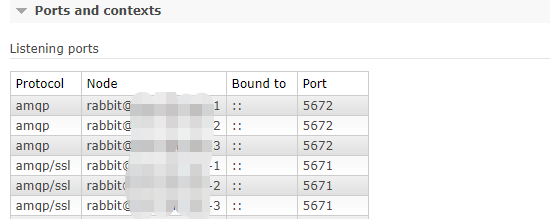centos6.9 rabbitmq set up SSL
I. Overview
Due to the requirements of the security team, it is necessary to add SSL to rabbitmq, and the java code uses the ssl key to connect.
2. Formal deployment
Environmental description:
| Operating system | ip | hostname | configuration | rabbitmq version |
|---|---|---|---|---|
| centos 6.9 | 192.168.31.7 | mq_01 | 1 core 2g | 3.8.2 |
| centos 6.9 | 192.168.31.216 | mq_02 | 1 core 2g | 3.8.2 |
| centos 6.9 | 192.168.31.214 | mq_03 | 1 core 2g | 3.8.2 |
The environment is to configure ssl based on the previous article, the link is as follows:
https://www.cnblogs.com/xiao987334176/p/12304608.html
Generate certificate
There is an article on the Internet saying that there is a github project that can generate a certificate with one click. The link is as follows:
https://github.com/Berico-Technologies/CMF-AMQP-Configuration.git
But the generated certificate fails the code test.
Therefore, on github, I found a rabbitmq ssl project, which provides certificates. Just use the certificate inside, and the code test can also pass.
The link is as follows:
https://github.com/Nepitwin/RabbitSSL
There are Python scripts provided, and there are 3 certificate files
ca_certificate.pem
client_certificate.pem
client_key.pem
Next, I will load these 3 files into rabbitmq
Configure rabbitmq
Create a certificate directory
mkdir /etc/rabbitmq/cert
Put the 3 certificate files in this directory
Modify configuration file
vi /etc/rabbitmq/rabbitmq.config
The full content is as follows:
[{ rabbit,[{ssl_listeners,[5671]},{ssl_options,[{cacertfile,"/etc/rabbitmq/cert/ca_certificate.pem"},{certfile,"/etc/rabbitmq/cert/client_certificate.pem"},{keyfile,"/etc/rabbitmq/cert/client_key.pem"},{verify,verify_peer},{fail_if_no_peer_cert,true}]}]}].
Restart rabbitmq
/etc/init.d/rabbitmq-server restart
View 5671 port
Command line view
Log in to any node, use the command line to view
# ss -tunlp|grep 5671
tcp LISTEN 0128:::5671:::* users:(("beam.smp",27893,96))
mq background page view
After logging in, click on the Ports and contexts below, you can see 5671

Reference link for this article:
https://blog.csdn.net/tiantang_1986/article/details/83996202
https://www.cnblogs.com/wyt007/p/9086250.html
Recommended Posts